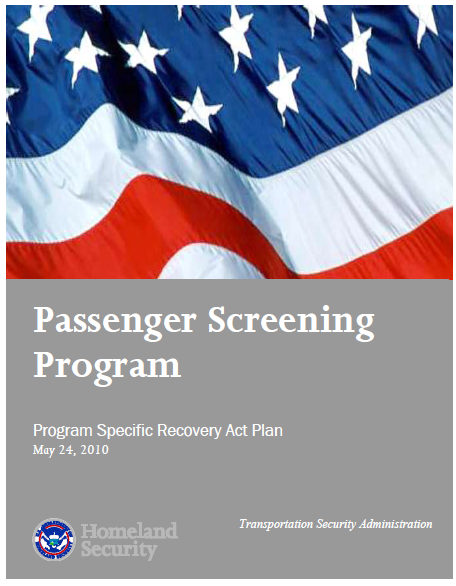 Passenger Screening Program Specific Recovery Act Plan
Passenger Screening Program Specific Recovery Act Plan
- 27 pages
- May 24, 2010
The Transportation Security Administration (TSA) Passenger Screening Program (PSP) Recovery Act Plan provides a summary of the specific projects and activities planned under the American Recovery and Reinvestment Act (ARRA). It fulfills the reporting requirement specified in Section 2.8 of the Office of Management and Budget (OMB) memorandum dated April 3, 2009 (Updated Implementing Guidance for the American Recovery and Reinvestment Act of 2009, M-09-15).
TSA’s PSP supports the Department of Homeland Security’s (DHS) goals of protecting our Nation from dangerous people and dangerous goods, and protecting our Nation’s critical transportation infrastructure by strengthening screening of travelers and their carry-on baggage to reduce the probability of a successful terrorist or other criminal attack to the air transportation system. PSP’s objective is to prevent the entry of explosives, firearms, and other prohibited items on commercial aircraft, while ensuring freedom of movement for people and commerce. To that end, PSP provides efficient life cycle management of security technology solutions and processes for the screening of passengers at security checkpoints at our Nation’s airports.
PSP was allocated $266million of the $1 billion in ARRA funding appropriated to Aviation Security. The funds will be obligated between Q3 FY09 and Q4 FY10. PSP will use the funding provided to accelerate its planned deployment schedule for new equipment by more than three years and strengthen PSP’s ability to meet its objectives and achieve the following benefits:
- Enhanced detection capability
- Improved checkpoint efficiency
- Preserved passenger privacy and dignity
Specifically, PSP will deploy the following enhanced checkpoint screening equipment: Advanced Technology (AT) X-ray, Bottled Liquid Scanners (BLS), Advanced Imaging Technology (AIT), Chemical Analysis Devices (CADs), and Next-Generation Explosive Trace Detectors (ETD).
…
Approximately $266 million in ARRA funds will be used to deploy state-of-the-art checkpoint screening equipment including Advanced Technology (AT) X-ray, Bottled Liquid Scanners (BLS), Advanced Imaging Technology (AIT), Chemical Analysis Devices (CADs), and Next-Generation Explosive Trace Detectors (ETD). This investment will accelerate TSA’s planned checkpoint screening technology deployment schedule by more than three years and strengthen the PSP’s ability to meet their objectives including:
- detecting explosive threats, weapons, and prohibited items concealed on passengers and their carry-on items;
- improving checkpoint efficiency through technology and process automation;
- preserving passenger privacy and dignity while increasing passenger safety;
- and providing layered security.
…
Enhanced Threat Detection Capability
State-of-the-art screening technology purchased with ARRA funds will enable TSA to accelerate, by as much as three years, the deployment of enhanced screening technology at passenger checkpoints throughout the country. For example, ARRA funding will expedite the deployment of:
- Advanced Technology X-ray (AT) – Advanced Technology systems are penetration X-ray based technologies that provide an enhanced view of a bag’s contents through improved image resolution. AT systems are upgradeable, offering a cost-effective platform to develop enhanced detection capabilities. The development of technologies to support liquids detection is occurring in parallel with the deployment of baseline ATs. Once complete and tested, these algorithms could be integrated with the deployed ATs to allow passengers to carry liquids through the checkpoint.
- Advanced Imaging Technology (AIT) – AIT is a new imaging capability that will be used to inspect a passenger’s body for concealed weapons (metal and non-metal), explosives, and other prohibited items. In addition, the AIT offers operators the opportunity to review anomalies on an individual, to determine if a hand wand and/or physical pat-down inspection is required.
